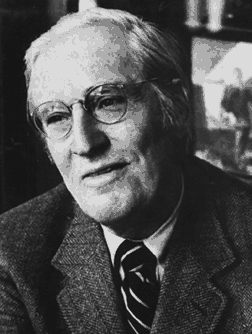|
|
Page Smith |
|
|
Page Smith |
Do I contradict myself?
Very well, I contradict myself.
I contain certain multitudes.
World War II was a tremendous influence. Drafted into the army, he served as a company commander with the 10th Mountain Division in Italy, and was wounded in action. The war revealed to him, as it did to other thoughtful members of his generation, that Enlightenment and liberal ideas about human nature and progress, long dominant in American culture, need to be reconsidered. This he did at Harvard University entering graduate school as an English major but switching to history. His mentor was Samuel Eliot Morison, whose fluency as a writer on American subjects converted him to the study of the American 17th and 18th centuries, and whose mastery of narrative history exemplified what he wished to do as a writer. As well, at Harvard, he absorbed Perry Miller's reconsideration of American Puritanism which, in turn owed much to the thought of Reinhold Niebuhr.
Page Smith
joined the faculty of the University of California at Los Angeles in 1953. He quickly established himself as a compelling lecturer and as a powerful presence, attracting students with the vividness of his teaching and opening the Smith home (he had married Eloise Pickard, a North Carolinian artist, in 1942) to undergraduate and graduate students. In these years he came into his own as biographer: James Wilson (1956), a study of that (then) neglected Federalist; John Adams (1962) a massive, two-volume, Bancroft Award-winning work; and The Historian and History (1964), among the most personal of his books, iconoclastic in its skepticism about conventional notions of objectivity.
In 1963 he moved to Santa Cruz, California, to the new campus of the University of California where he became the founding Provost of Cowell College, the first of the colleges around which the university was organized, colleges where teaching would be emphasized and the impersonality of the large university minimized. The innovations at Santa Cruz were modest enough, but hotly opposed by many. Page Smith led the reformers with eloquence and courage and endeared himself to another generation of students; in many ways he found the counterculture atmosphere of the 1960s congenial. But the power of established ways often frustrated him and the inescapable pressure for specialization and departmental allegiance undercut the colleges, and in 1973 he resigned from the university.
Books, essays, lectures, and newspaper columns flowed from the self described "fastest typewriter in the West" in the two decades that followed. And there were incessant community engagements, the Socratic "penny university" open to all with weekly meetings to discuss issues of the day; the philanthropic William James Association which sponsored, under the inspiration of Eloise Smith, a prison arts project. Page Smith's books, wide-ranging, provocative, readable, found the literate general audience at which they were aimed. Among them: The Chicken Book (1975); the Constitution, A Documentary and Narrative History (1978); an aptly titled collection of essays, Dissenting Opinions (1984); a spirited return to the attack on academic folly, Killing the Spirit (1990). Twenty-two volumes in all, including two which appeared at the time of his death, in Santa Cruz, of leukemia, on August 28, 1995.
Page Smith had an uncanny knack for anticipating subjects that would later gain popularity: for example his As A City Upon A Hill (1966), a study of the small town in American history; and Daughters of the Promised Land (1970) the role of women. The climax of his life's work, his most ambitious and representative narrative was his eight volume People's History of the United States (I976-1987), beginning with two volumes on the Revolution and ending with the New Deal and World War II, those defining events of his own life. Personal, impassioned, discursive, he found his subject "endlessly fascinating and absorbing" and wrote of it in a "perpetual state of wonder and awe," and this is conveyed powerfully to the reader. "A book is a poor contrivance to catch a life in," he had written in John Adams. How much less satisfactory, then, is so reductive a form as an obituary? How to catch the extraordinary presence of the man, who combined innate modesty with effortless command, passionate truth-telling, however unpalatable, with personal decorum, power with kindness, seriousness with amused joy? How to convey the spirit of his idea of history, grounded in the past - but speaking to the present affirming life?
John Dizikes
University of California
Santa Cruz
Page Smith
,
from the OAH Newsletter (Organization of American Historians
Volume 23, Number 4 / November 1995

|
Good Times andBad Times
Page tells of
the 10th Mountain Division
| HOME | BACK |